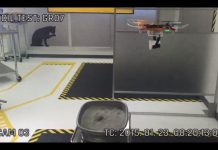ORLANDO, July 1, 2020 – A University of Central Florida researcher is developing new technology to make sure people are getting the food they think they’re eating.
The work is funded by a recent $490,000 U.S. Department of Agriculture National Institute of Food and Agriculture, Agriculture and Food Research Initiative grant to create an easy-to-use and highly sensitive device to detect food fraud, such as the substitution of pork in beef products.
Adulterated food results in people paying more for their food than it’s worth, as sometimes foods are bulked up with less expensive filler products. Eating the wrong food can also violate some religious restrictions on foods consumed and be a concern for people with food allergies.
Adulterated food is a problem for the U.S. food industry as well, costing it $10 billion to $15 billion a year, according the Consumer Brands Association.
Leading types of reported fraudulent food are fish and seafood, oils and fats, alcoholic beverages, meat and meat products, dairy products, grains and grain products, honey and other natural sweeteners.
Current tests to detect adulterated food are either expensive and complicated or are easy to use and cheap, but not as effective, says Xiaohu Xia, an assistant professor in UCF’s Department of Chemistry and the project’s principal investigator.
“This research aims to establish a simple method using a new test strip, similar to a home pregnancy test, to detect if there are adulterants in food products,” he says. “It would be a test inspectors, as well as, consumers could use.”
To do this, the researcher and his team will update existing detection technology, known as a colorimetric lateral flow assay, which uses gold nanoparticles to detect meat proteins.
They will create a new metallic coating, made of platinum, palladium or iridium, that will go around the gold nanoparticles to increase their sensitivity.
Preliminary results showed that using a platinum coating made the tests 100 times more sensitive than current colorimetric lateral flow assays.
This makes them closer in effectiveness to the more expensive and complicated, but precise, enzyme-linked immunosorbent assays.
The researchers will now work to increase the sensitivity and reliability of their test, including by using different metals for the coating. For this project, they are specifically looking for the presence of meat and blood in foods, such as pork protein in a sample of beef.
The work build’s on Xia’s research into biosensing, including recent work to create a biosensor for early cancer detection.
###
Xia will collaborate with Qinchun Rao, an assistant professor in Florida State University’s Department of Nutrition, Food and Exercise Sciences. Xia’s lab will be building the test strip, while Rao’s lab will be testing its effectiveness in detecting adulterated meat. The project is scheduled for completion in 2023.
Xia joined UCF’s Department of Chemistry, part of UCF’s College of Sciences, in 2018. He has a joint appointment in UCF’s NanoScience Technology Center. Prior to his appointment at UCF, he worked at Michigan Technological University as an assistant professor and at Georgia Institute of Technology as a postdoctoral researcher. He has published more than 50 journal articles and received multiple research grants.
CONTACT: Robert H. Wells, Office of Research, 407-823-0861, [email protected]
TDnews














